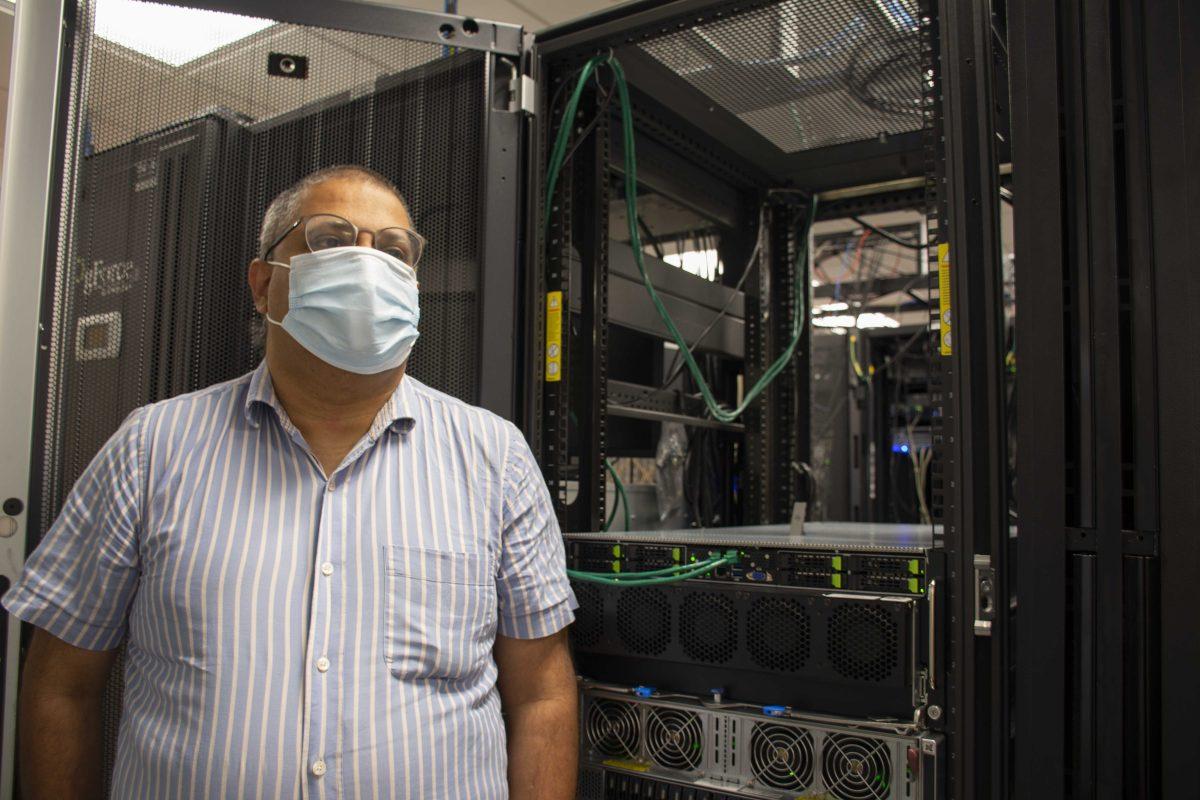A team of LSU scientists and computer science students helped develop a new treatment that could ease symptoms and shorten the duration of the COVID-19 virus in people, especially the vaccinated.
The treatment, known as SM-19, is a product of LSU’s DeepDrug team that uses artificial intelligence to develop drugs and test their effectiveness. The team worked in collaboration with Skymount Medical, a Canadian biotech company.
The drug, consisting of a combination of anti-cancer and anti-parasitic drugs, underwent testing at the Illinois Institute of Technology late last year and was shown to be 97% effective in reducing the viral load and transmission of COVID-19 in animal cells. The treatment, delivered orally, also reduces the duration of severe symptoms.
Skymount Medical began human testing of the treatment on Aug. 11. Human clinical trials are currently underway in Ukraine and California’s Riverside University Health System.
“This would be especially useful for people who are vaccinated who don’t get sick enough to go into the ICU but could still get pretty sick and need to mitigate their symptoms,” said Adam Bess, LSU computer science graduate student and member of the DeepDrug team.
Helping to ease the suffering of those infected and making life easier for those infected at home is critical to ending the pandemic, associate professor of computer science and DeepDrug team leader Supratik Mukhopadhyay said.
DeepDrug’s artificial intelligence predicts how molecules combine together and determine what drugs they’ll create, Mukhopadhyay said. The team’s initial plan was to use the artificial intelligence to condense the timeline and reduce the costs of developing antibiotics to work against drug-resistant bacteria, known as superbugs.
A typical antibiotic would take almost a decade and close to $3 billion to develop. DeepDrug could reduce development time to a month or less at a fraction of the cost, Mukhopadhyay said.
“Suppose a patient is dying from a drug-resistant bacteria, you can’t do anything; it will take years to get the drug. By that time the patient is already dead,” he said. “We thought if we could bring [the creation of drugs] down to months or to days it could actually save lives.”
When COVID-19 hit, the DeepDrug team, consisting of Mukhopadhyay, Bess, PhD student Frej Berglind and associate professor of biological sciences Michal Brylinski, shifted its focus to developing treatments for the virus.
“As COVID hit, we thought that we could repurpose our DeepDrug engine for COVID, to discover drugs for [the virus],” he said. “So far we have [discovered drugs] for bacteria and now here is this new beast.”
Mukhopadhyay and Bess were at the world headquarters of TED giving a talk about the applications of DeepDrug when the pandemic began. When they arrived back in Baton Rouge, they began reconfiguring the team’s machines to repurpose drugs and compounds into viable treatments for COVID-19, Mukhopadhyay said.
By July, the artificial intelligence housed in Patrick F. Taylor Hall was ready to research how to “repurpose existing FDA approved drugs that are today used for other purposes towards [treating] COVID,” Mukhopadhyay said.
The DeepDrug is producing results that are “more comprehensive than a lot of the other players in the biotech start-up space,” Bess said. “We are getting results no one else has found.”
Skymount has been involved with DeepDrug as early as 2016 and have “always supported the work of Dr. Mukhopadhyay,” Chris Galliano, Skymount’s Chief Technology Officer, said. It wasn’t until the pandemic that their partnership reached its apex.
“When COVID devastated the state of Louisiana after Mardi Gras of 2020 we fully committed to expanding the research of DeepDrug with a sole focus to end the pandemic,” Galliano said.
Skymount’s role in the collaboration was to provide funding and manufacturing to the LSU team.
The biotech company provided all of the funds required to conduct pre-clinical research on over 60 of the drug candidates that DeepDrug developed, Galliano said.
They also contracted other pharmaceutical companies to get access to approved drugs as they were needed as trials began, Bess explained.
DeepDrug has applications beyond COVID-19.
As vaccines and treatments like SV-19 become more available to the public, DeepDrug will be used to solve issues neglected by traditional pharmaceutical players, Mukhopadhyay said. The team currently hopes to work at developing drugs for cancer, anti-aging and neurobiological diseases.
By reducing the development time and using generic drugs to reduce costs, Skymount and DeepDrug are able to make medicine available to those that would typically be priced out of life-saving medical treatments, Galliano said.
“The possibilities are endless, but our main focus is to improve the state of global health and use our talents to make the world a better place for children to not suffer no matter their geographic location or economic situation,” he said. “Poverty and disease should not be synonymous. That was the old way – we are the new way.”





